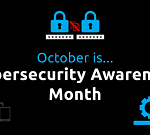For most of us, 2020 was a terrible year. However, there is one group that’s benefited from the pandemic: Cybercriminals. As local governments issued stay-at-home orders and advisories, many people’s jobs moved online. The surge in remote work and virtual learning combined with the spike in web traffic spurred by people seeking information about the public health crisis created plenty of opportunities for bad actors to infiltrate vulnerable networks, carrying out phishing schemes and launching ransomware.
The FBI’s Internet Crime Complain Center (IC3) saw the number of cybersecurity complaints it received jump from 1,000 per day to between 3,000 and 4,000, Tonya Ugoretz, the deputy assistant director of the FBI’s Cyber Division, reported during a webinar hosted by the Aspen Institute in April, according to The Hill article “FBI sees spike in cyber crime reports during coronavirus pandemic.” The article also notes that cybersecurity companies noticed a rise in hacking attempts, and malicious actors also targeted health agencies, including the World Health Organization (WHO).
With the pandemic and virus-fueled spike in cybercrime extending into 2021, what can businesses do to fend off the relentless barrage of hacking attempts and minimize their chances of experiencing a disastrous data breach? One cutting-edge IT security solution has emerged as an effective method for safeguarding corporate networks and infrastructure against cyberattacks: The secure access service edge (SASE) model.
1. What Is SASE?
Basically, SASE is a cybersecurity concept that involves combining SD-WAN with network security functions, including secure web gateway (SWG), cloud access security broker (CASB), zero-trust network access (ZTNA) and Firewall as a Service (FaaS), according to the Gartner blog entry “Say Hello to SASE (Secure Access Service Edge).” Gartner identified SASE as an up-and-coming hot commodity in the networking world in December 2019.
2. How Does SASE Work?
SASE solutions leverage cloud-native security features along with SD-WAN functionality, which the SASE supplier delivers via the cloud as a service, according to Cisco. This works to address the needs of businesses that are undergoing digital transformation and rely increasingly on cloud solutions. Overall, the SASE framework gives enterprise security professionals the tools necessary to fine-tune performance, reliability, cost and security for every network session based on context and user identity, McAfee explains.
3. What Are the Benefits of SASE?
There are tons of reasons to rely on SASE for cybersecurity. Here are some of the main advantages of utilizing the framework:
- Simpler and less expensive security operations: Relying on the SASE model minimizes the number of security tools and solutions your organization relies on, according to Palo Alto Networks.
- Secure access for remote and mobile users: SASE solutions are ideal for businesses that want to ensure employees working from home can safely access the apps and resources they need to do their jobs, according to Cisco.
- Increased visibility: By consolidating various networking and IT security functionalities in one solution, the SASE model often boosts security and network transparency, according to Masergy.
- Centralized management: The solution often allows security and network staff to do their work more effectively by combining network and security functions in one place, Cisco explains.
4. How Can I Implement SASE for My Business?
Various IT solution providers offer SASE. It’s important to consider your company’s particular pain points and goals when evaluating your options. Advisory services from technology experts can help streamline the process of shopping around for the right technology for your business. Stratosphere Networks has a team of trusted advisors available to assist you, and we also offer our own SASE solution.
If you’d like to learn more about the benefits of SASE and how to determine whether it’s a good choice for your company, our security analysts can answer any questions you have. Just give us a call at 877-599-3999 or email sales@stratospherenetworks.com.



